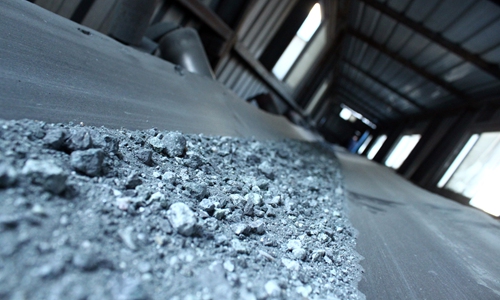HOME >> BUSINESS
China moves to pay for iron ore in yuan
By Xie Jun and Qi Xijia Source:Global Times Published: 2019/11/20 21:11:30
Part of broader drive to gain voice in pricing metals

File photo: IC
China is taking steps to pay for its huge iron ore imports in yuan, a move experts said shows a gradual but irreversible trend that China will play a more decisive role in pricing metal commodities thanks to the country's burgeoning market demands.
Brazilian miner Vale SA recently signed a physical iron ore spot deal to supply the Shandong-based steel company Shandong Laigang Yongfeng Steel Trade Corp using the iron ore price from the Dalian Commodity Exchange (DCE).
This is the first time that an overseas miner has used a Chinese iron ore futures contract for a spot trade, a change that the DCE called a "milestone" in enhancing China's pricing influence.
According to a statement from the DCE on November 14, Yongfeng will buy some of Vale's iron ore fines with settlement based on DCE's iron ore futures prices for May 2020 delivery as well as a premium/discount, known as a basis trading contract.
"The decision to switch to the new settlement mode shows that Brazil attaches importance to the Chinese market by choosing a more convenient way to sell iron ore to Chinese buyers," Liu Wensheng, deputy director of the ferrous metal department at First Futures, told the Global Times on Wednesday, adding that the new basis trading mode can help Chinese iron and steel manufacturing companies avoid foreign exchange risks.
Vale SA already began mixed ore production and yuan-denominated spot trading in Chinese ports since 2015 to meet the needs of their end customers in China, according to the DCE statement.
Vale's deal with Yongfeng came just weeks after London-based iron ore miner Rio Tinto signed its first iron ore spot trading contract denominated in renminbi. Both are vivid examples of the gradual transfer of iron ore pricing from overseas markets to China, experts said.
"In the past, international companies mostly referred to overseas benchmarks, such as Platts benchmark for iron ore and Brent for crude, for pricing in their commodity transactions, including with Chinese companies. This is very abnormal considering the huge market demand from China," Wu Chenhui, a non-ferrous metals expert, told the Global Times on Wednesday.
China, the largest iron ore importer in the world, imported 1.064 billion tons of iron ore in 2018, according to customs data released in January.
But as China surges in economic power and its market demand burgeons further, it is possible that the country will take a leading role in the pricing of many commodities, including iron ore, experts said.
Liu said it will be a trend for China to play a bigger role in pricing for iron ore, citing China's large and still burgeoning market demand.
"Take Vale SA for example. About 75 percent of the company's iron ore products were exported to China in the second half of this year, compared with about 55 percent in 2018 on average," Liu said, adding that in 2020 China will need to purchase even more iron ore thanks to the booming real estate industry.
China's huge demands for metals are not just restricted to iron ore. In general, China imported more ferrous metals products in the first half of 2019 compared with a year earlier. Customs data showed that during the period, China's imports of copper ore surged 16.58 percent, while imports of lead ore rose 33.35 percent.
"I think this trend of pricing by China has been very clear in the metals industry, with China being the largest client for those commodities," Liu said.
Wu also agreed that China will lead the pricing of many commodities, including iron ore. "It will take place step-by-step, but with a government push, rising market demand and the waning of US dollar hegemony, I believe it's an irreversible trend," Wu said.
Besides iron ore, the launch of China's first crude oil futures contract in Shanghai has also added an Asian benchmark to the global oil sector, which challenges the dominance of overseas price-makers. But as oil is more vulnerable to geopolitical changes, it will be more difficult for China to have a bigger say in setting prices, Liu said.
Posted in: ECONOMY,BIZ FOCUS